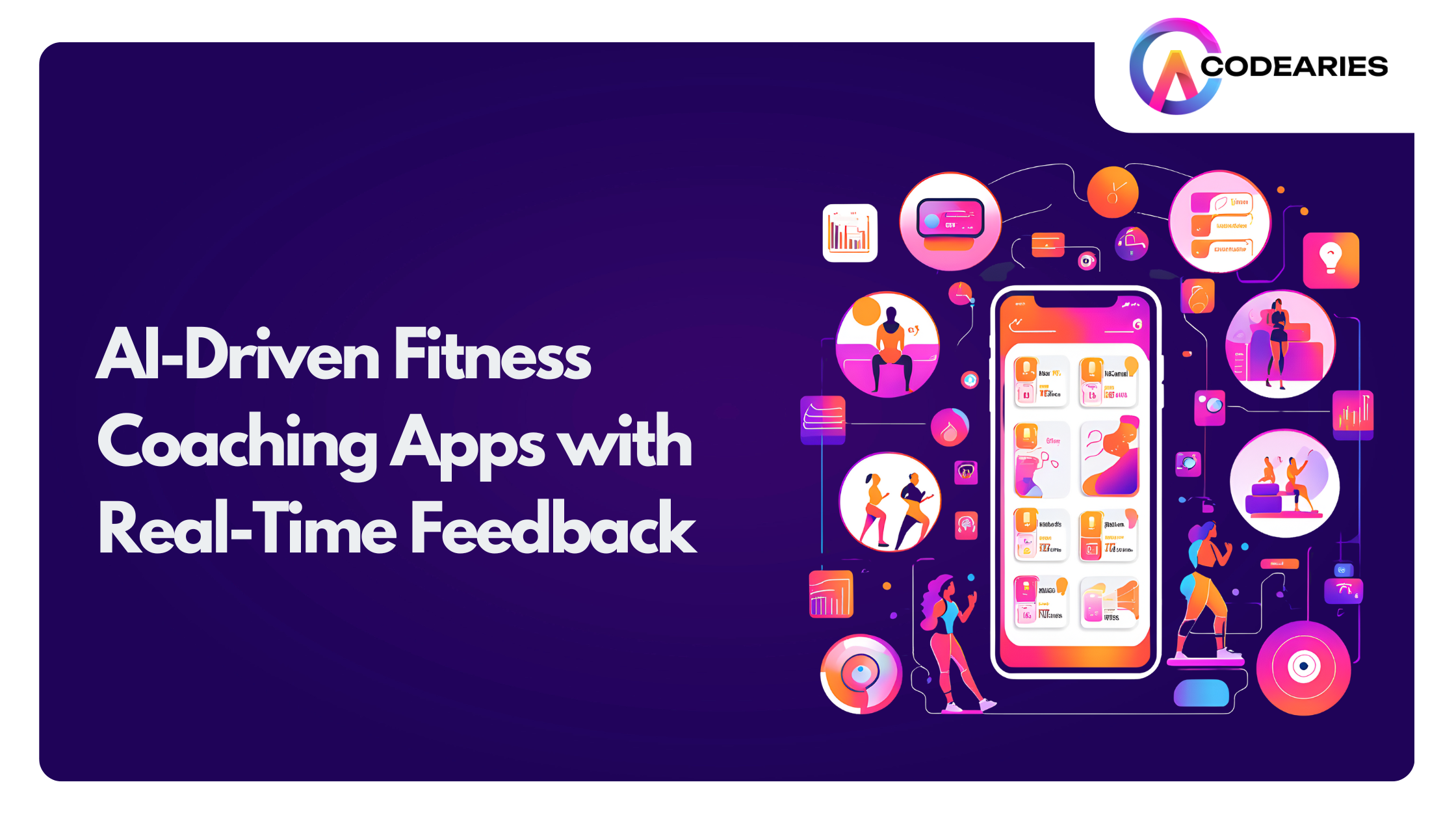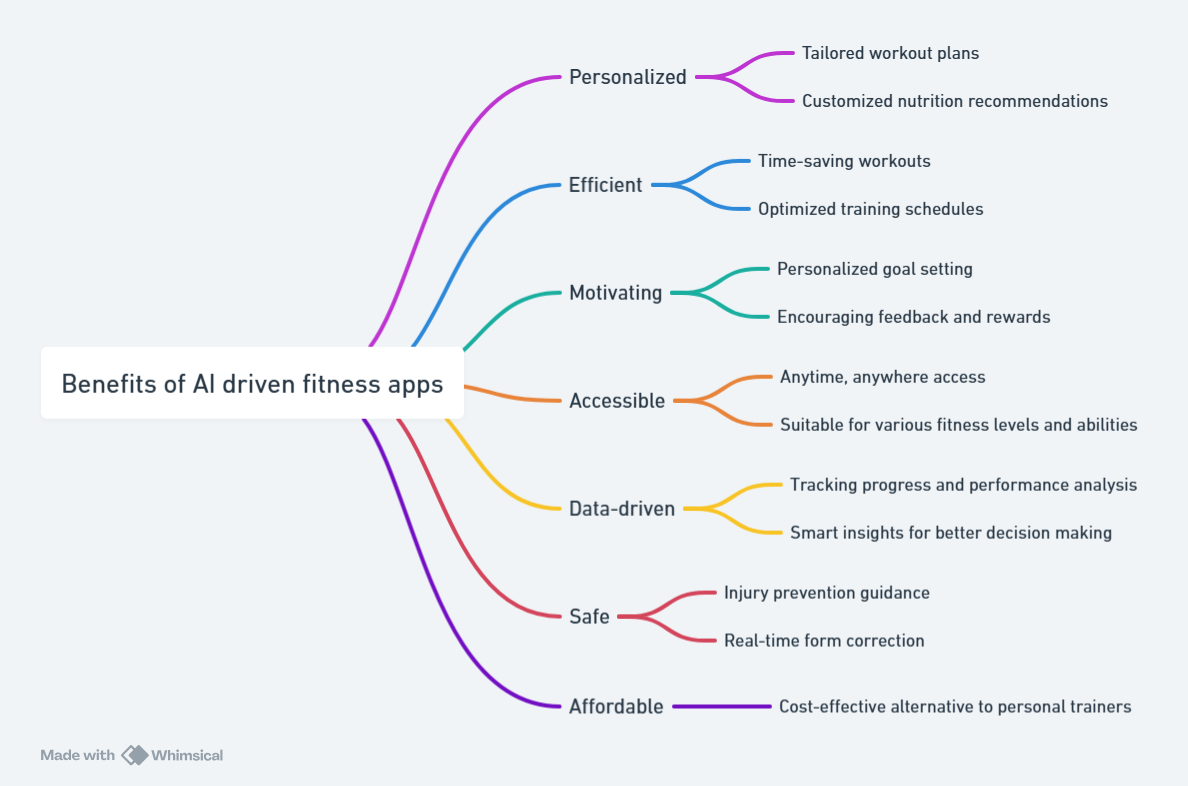
Imagine a fitness coach who never tires, is always available, and learns precisely what your body needs at each stage of your fitness journey. Welcome to the world of AI-driven fitness coaching apps with real-time feedback, where advanced algorithms turn your smartphone into a pocket-sized personal trainer. These digital coaches analyze your movement, monitor your progress, and even offer on-the-spot advice to keep you going strong. But how do they work, and why are they creating a buzz in the fitness world?
This article will dive deep into these cutting-edge apps that blend technology with fitness, making personal training accessible, motivating, and uniquely suited to your goals.
What Are AI-Driven Fitness Coaching Apps?
AI-driven fitness apps are transforming the way people approach their fitness journeys. By leveraging artificial intelligence, these apps offer tailored workout plans, real-time guidance, and continuous motivation, making it easier for users to stay committed and achieve their fitness goals. The AI in Fitness and Wellness Market Size is valued at USD 8.60 billion in 2023 and is predicted to reach USD 34.73 billion by the year 2031 at a 19.5% CAGR during the forecast period for 2024-2031.Here’s how AI-powered fitness coaching works:
Personalized Workout Plans
- Goal Assessment: The app begins by understanding your fitness goals, whether it’s weight loss, muscle gain, or overall health improvement.
- Custom Workout Design: Based on your goals, fitness level, and preferences, AI generates a personalized workout plan with the right mix of exercises, sets, and reps.
- Dynamic Adjustments: As you progress, the AI adapts your plan, gradually increasing intensity to ensure continuous improvement and prevent plateaus.
Real-Time Feedback and Form Correction
- Movement Tracking: Using sensors or camera technology, the app tracks your movements during workouts to monitor accuracy.
- Form Analysis: The AI analyzes your form and provides instant feedback to help you maintain proper technique, reducing the risk of injury.
- Corrective Guidance: If necessary, the app offers actionable tips and adjustments to refine your form and boost the effectiveness of each exercise.
Motivation and Accountability
- Progress Monitoring: The app keeps track of your performance, offering updates on achievements and milestones.
- Personalized Coaching: AI sends motivational prompts, celebrates successes, and encourages you to progress toward your goals.
- Community Interaction: Many apps include social features that let you connect with others, share progress, and engage in challenges, helping maintain a sense of accountability and camaraderie.
These AI-driven features combine to provide a holistic, customized approach to fitness, ensuring users remain motivated and on track to achieve their personal fitness goals.
Why AI in Fitness Coaching?
Why choose an app with artificial intelligence for fitness? AI’s primary strength is its ability to analyze, learn, and adapt based on individual data. While traditional fitness apps provide static programs, AI-driven apps use data like movement patterns, workout history, and daily energy levels to create a tailored approach. They can motivate you when your energy dips, adjust your workout if you’re tired, and track every rep and step as a live coach would. Personalization and real-time insight are the keys here, helping users make gains faster and safer.
Benefits of Real-Time Feedback
The real power of these apps is in their real-time feedback. Imagine being corrected in the middle of a plank or receiving motivation during that last set of squats. This immediate guidance doesn’t just improve form and builds confidence, allowing users to train with the assurance that they’re getting the most out of every movement. For beginners, this feedback is precious as it prevents poor habits. For seasoned athletes, it refines performance. Real-time feedback is like a personal coach who spots your every move and gives instant correction and encouragement.
How AI Algorithms Power Real-Time Feedback
Behind each coaching app is a series of complex, intelligent algorithms that interpret data in milliseconds. These algorithms assess live input from your device’s camera, motion sensors, or wearables, tracking every muscle movement. For instance, when you’re doing a lunge, the AI algorithm can detect if your knee alignment is off and suggest an immediate adjustment. This level of sophistication means that AI-driven apps are always “on”—observing, learning, and coaching in real-time, making every rep more effective.
Types of Real-Time Feedback
AI-driven fitness coaching apps are revolutionizing how users approach their workouts by integrating real-time feedback mechanisms that enhance performance, promote correct form, and optimize overall fitness progress. Below are some key feedback types that these apps employ to support users in their fitness journey:
Form and Technique Optimization
- Video Analysis: AI-powered video analysis tools can automatically assess the user’s exercise technique by processing footage in real-time. Using visual overlays, arrows, or Text annotations, the system highlights areas for improvement, such as misalignment or improper posture, making corrections easy to follow and apply.
- Pose Estimation: Leveraging computer vision, AI can track the user’s body movements during exercises and compare them to an ideal form. Analyzing posture, angles, and movement trajectories provides immediate feedback to correct misalignments, helping users maintain proper form throughout their workout.
Real-Time Performance Monitoring
- Heart Rate Monitoring: AI algorithms constantly analyze the user’s heart rate data during workouts, providing insight into exercise intensity. Users receive real-time feedback, ensuring they stay within their target heart rate zones to maximize fat burning, improve cardiovascular health, or optimize endurance training.
- Calorie Burn Estimation: Using the user’s heart rate, age, weight, and exercise data, AI calculates an accurate estimate of calories burned. This helps users understand the efficiency of their workouts, whether their goals are weight loss or maintaining fitness levels.
- Repetition Counting: AI-powered sensors can automatically count repetitions, ensuring users stay on track with their set and rep targets. This feature helps maintain consistency, pacing, and form during squats, push-ups, and weight-lifting exercises.
Adaptive and Personalized Workouts
- Dynamic Workout Adjustments: AI continuously monitors the user’s performance and adjusts the workout in real-time based on factors like energy levels, exertion, and fatigue. If the user is performing well, the app can increase intensity; if the user is struggling, it can reduce the difficulty to avoid overexertion.
- Progressive Overload Recommendations: To ensure continual improvement, AI recommends incremental increases in resistance or weight, preventing training plateaus. It customizes these adjustments based on the user’s fitness level, workout history, and progress.
Virtual Coaching and Motivation
- Voice Guidance: AI-powered voice assistants can provide in-the-moment instructions and motivation during workouts. These virtual coaches offer verbal cues on proper form, pacing, breathing, and personalized encouragement to keep users engaged and motivated.
- Motivational Feedback: AI sends tailored motivational messages as users progress, reminding them of milestones achieved or suggesting new challenges to push their limits. This boosts morale and fosters a sense of accomplishment, key to maintaining long-term consistency.
Injury Prevention and Recovery
- Real-Time Injury Risk Analysis: AI can identify biomechanical flaws or signs of stress that could lead to injuries by analyzing movement patterns. It alerts users to these risks and offers advice on modifying their technique or adjusting their workout to prevent strain and injury.
- Recovery Guidance: After a high-intensity workout, AI offers recovery recommendations based on user data, such as the intensity of the session and individual physiological responses. This can include advice on optimal rest periods, hydration, stretching routines, foam rolling, or other recovery exercises.
The Role of Wearables
Wearables like smartwatches and fitness bands have become essential for AI-driven fitness apps. These devices offer continuous data on heart rate, movement, and stress levels. AI apps sync with wearables to provide a real-time picture of your health. Imagine a workout where the app detects an increased heart rate during a jog and then suggests a cool-down based on how hard you’ve pushed. The integration with wearables allows the app to read your body in real-time and make necessary adjustments, enhancing every workout.
AI-Driven Metrics for Fitness Tracking
AI fitness apps don’t just track steps and calories; they delve into deep metrics to improve your fitness journey:
- Heart rate variability (HRV): Monitors your cardiovascular response, signaling how hard you can push.
- Caloric expenditure: A detailed account of energy burned.
- Recovery metrics: AI tracks your body’s recovery, making it easy to understand when to go hard or take a rest day.
These metrics add scientific precision to your workouts, helping you holistically improve your health.
Integrating Biofeedback into AI Apps
Advanced AI-driven apps incorporate biofeedback to offer insights beyond physical performance. Metrics like HRV, breathing patterns, and even muscle fatigue levels give users a comprehensive view of their body’s current state. By understanding these physiological markers, the app tailors workouts that consider physical strain, mental energy, and overall health. This holistic approach not only enhances performance but also improves recovery and well-being.
Motion Tracking and Form Correction
Motion tracking has redefined workout effectiveness and safety in AI fitness apps. Using a smartphone camera or a wearable sensor, these apps detect real-time movement and identify areas that need improvement. For instance, if you’re squatting too low or putting strain on your knees, the app instantly corrects you. Form correction technology minimizes the risk of injuries and maximizes workout efficiency, making every move count.
Conclusion
AI-driven fitness coaching apps are transforming personal fitness by providing real-time, personalized feedback on form, performance, and progress. These apps analyze wearables, sensors, and camera data to offer tailored workouts, ensure proper technique, and prevent injuries. With dynamic adjustments, motivational prompts, and community support, users stay engaged and on track to achieve their goals. As these apps evolve, they’ll enhance fitness training, making it brighter, safer, and more accessible for everyone. Whether you’re a beginner or a seasoned athlete, AI-driven coaching is the future of fitness, helping you reach your full potential anytime, anywhere.
FAQs
How is AI impacting the fitness industry?
AI transforms fitness by providing personalized workout and nutrition plans, improving performance tracking, and offering virtual coaching. AI-powered apps and wearables help optimize workouts, track progress, and prevent injuries by analyzing movement patterns and form.
Can AI replace personal trainers?
AI can support fitness routines but cannot fully replace personal trainers. While AI offers personalized plans and feedback, it lacks the human touch for motivation, real-time adjustments, and emotional support, which trainers provide to guide clients through workouts safely and effectively.
How are sports using AI?
AI is used in sports for performance analysis, injury prevention, and strategy optimization. Teams leverage AI to analyze player stats, monitor health, and scout talent. Video analysis tools break down game strategies, while wearables track player conditions to prevent injuries.
What are the benefits of AI in health and fitness?
AI helps with personalized fitness plans, real-time progress tracking, and injury prevention. It enables remote coaching and offers tailored dietary advice. In health, AI aids in early disease detection and personalized treatments, improving overall fitness and wellness outcomes.


